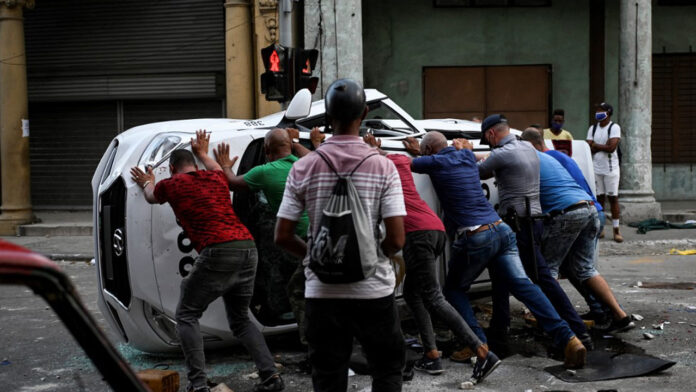
For the first time in years, people have taken to the streets in Cuba in large numbers to protest the island’s Communist government.
Demonstrators mainly gathered in the municipality of San Antonio de los Banos, south-west of Havana, on Sunday to protest the economic troubles and political repression in the one-party country, as shown on videos circulating on social media.
Further rallies were held in Havana, Holguin, Matanzas, Camaguey and Santiago de Cuba.President Miguel Diaz-Canel himself went to San Antonio de los Banos and defiantly addressed all Cubans via national television.
“We will not surrender the sovereignty and independence of this nation,” said Diaz-Canel, who has been president since 2019 and also leads the Communist Party, the most powerful position on the island.”If they want to defeat the revolution, they will have to go over our dead bodies.”
“We call on all revolutionaries to take to the streets and to defend the revolution everywhere,” Diaz-Canel said.According to government opponents, security forces cracked down on protesters on Sunday.
The US warned Havana against using violence on demonstrators.“The US supports freedom of expression and assembly across Cuba, and would strongly condemn any violence or targeting of peaceful protesters who are exercising their universal rights,” security advisor Jake Sullivan wrote on Twitter.
Julie Chang, acting assistant secretary for the US Department of State’s Bureau of Western Hemisphere Affairs, voiced similar concerns.
“We stand by the Cuban people’s right for peaceful assembly,” she wrote on Twitter.Large demonstrations against Cuba’s government are rare.
Most recently, the so-called San Isidro movement, founded by opposition artists, academics and journalists to protest censorship in Cuba, has organized protests, garnering international attention.
Diaz-Canel only took over from Raul Castro as leader of the Communist Party in April, meaning for the first time since the victory of the revolution in 1959, the Castro brothers are holding no leading positions in the country.
However, the leadership change hasn’t brought about a different political orientation.Most Cubans are also suffering from the consequences of the country’s planned economy and the US sanctions imposed on the island state.
